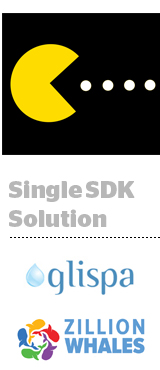 App publishers are paring down the number of software development kits (SDKs) they use to monetize their ad inventory.
App publishers are paring down the number of software development kits (SDKs) they use to monetize their ad inventory.
On Wednesday, German mobile marketing outfit glispa tossed its hat in the ring with the launch of Ampiri, its mediation solution.
Ampiri is built from technology glispa acquired from MoneyTap, a St. Petersburg, Russia-based company with its hooks in around 250 different ad networks and demand-side platforms.
Glispa, itself owned by publicly traded UK ecommerce company Market Tech Holdings following a $77 million majority stake investment in March 2015, declined to disclose the MoneyTap price tag.
Ampiri, which has been in beta the past eight months, operates like a classic mediation platform, allowing developers to optimize demand for their inventory across multiple ad networks at the same time, with access to all the usual ad formats, from banners and interstitials to native units and rewarded video.
But the tech is also folded into glispa’s existing stack of user acquisition, performance, native advertising and app store ranking tools. Developers can flow their user data into Ampiri through glispa’s audience platform, where it’s anonymized and segmented into clusters for targeting purposes.
“We also look at things like the geo, where the ad opportunity came from and the ad placement to help us reach people in a more native way that’s less alienating and causes less churn,” said Freddy Friedman, glispa’s chief product officer.
Glispa is admittedly a bit late to the mediation game. Numerous others are already in-market, including Fyber, Supersonic by ironSource, MoPub, Smaato, AdsNative and AdtoApp, among others.
Part of the difference is in the service layer, Friedman said. Developers can go self-serve on Ampiri or opt for a more managed service approach where glispa handles everything from optimization to billing. Most other players are self-serve only.
Ampiri allows publishers to choose which ad networks and DSPs they want to integrate with on the back end, and glispa, which focuses on emerging markets. maintains a dedicated team of sales support people and engineers who are trained to help clients pick the right local networks for their particular inventory and geographic location.
“There’s room for customization,” Friedman said. “If they want, we can sit down with them and look at the core SDK libraries they want as part of their package and then we deliver that package.”
AdExchanger Daily
Get our editors’ roundup delivered to your inbox every weekday.
Daily Roundup
It’s part of glispa’s effort to position itself as a one-stop monetization shop for publishers swimming in pure-play solutions. The company reaches roughly 1 billion active monthly users a month.
“There’s room in the market for a transparent solution that does more than just connect publishers to demand sources,” Friedman said.
Glispa had been testing Ampiri with select clients in beta for nearly a year, including Russian developer Zillion Whales, which maintains a portfolio of more than 30 games and mobile apps.
Before taking Ampiri out for a spin, Zillion Whales used a separate monetization solution for nearly every title, which made it difficult to track performance and make real-time tweaks to optimize campaigns on the fly, said Ksenia Shneyveys, a marketing manager at Zillion Whales.
After taking Ampiri out of a test drive, fill rates and revenue increased across the board at Zillion Whales. One of its more popular titles, a Russian-language game called “Talking Krosh” that’s based on a popular Russian cartoon, saw revenue grow by around 30% after integrating the SDK.
Zillion Whales has since started running 100% of its traffic through Ampiri, said Shneyveys, who noted that she’s able to save time by using one SDK to mediate rather than managing separate integrations of standalone solutions, which can get fairly onerous.
“There are many publishers that are locked down by contracts or specific SDK integrations in their app, which means they can’t fully take advantage of all the demand-side partners in the market,” Friedman said. “They also want transparency and more control over their partners and over each ad opportunity. That’s what we’re trying to solve for.”
MoneyTap’s 15 employees will move to glispa’s headquarters in Berlin, bringing the company’s total headcount to nearly 200. Glispa also has offices in Beijing, Bangalore, San Francisco, Tel Aviv and São Paulo.













